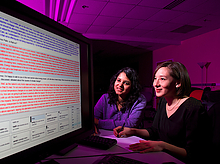Daumé and Rao win Best Long Paper Award at ACL 2018

A faculty member and graduate student in the Computational Linguistics and Information Processing (CLIP) Laboratory have been recognized for their work in neural networks and clarification questions.
Hal Daumé III, a professor of computer science with an appointment in the University of Maryland Institute for Advanced Computer Studies (UMIACS), and Sudha Rao (left in photo), a 5th-year doctoral student in computer science, will receive a Best Long Paper award at the Association for Computational Linguistics 2018 conference, held this July in Melbourne, Australia.
The Association for Computational Linguistics (ACL) is an international society of scientists who research computational problems involving human language. The organization’s annual conference and its journal, Computational Linguistics, are the leading publications of the field.
ACL describes this year’s conference as “super competitive,” accepting about 25 percent of the 1,500 papers submitted. The paper by Daumé and Rao is one of only three to receive the Best Long Paper award.
"Learning to Ask Good Questions: Ranking Clarification Questions using Neural Expected Value of Perfect Information” contributes to the field by creating a data set from the online forum StackExchange, in addition to developing a model to ask useful clarification questions.
“Most of the previous research in this area focuses on teaching machines to generate reading comprehension questions,” says Rao, who is lead author of the paper. “What we were trying to explore is something different—these questions would ask for missing information in a given context.”
Rao and Daumé analyzed data from three forums in which users ask and answer questions related to Unix-based operating systems.
Their objective is for the computer to learn how to consider the context, and then ask the most useful clarification question to produce the most helpful answer.
"The high level goal of this research is to teach machines to ask useful clarification questions so that they can better understand humans," Rao says. “It’s important in today’s world where humans are interacting with machines for various reasons.”
She sees the research as the basis for machines that could provide tech support or help sellers write more complete product descriptions online.
–Story by Maria Herd
